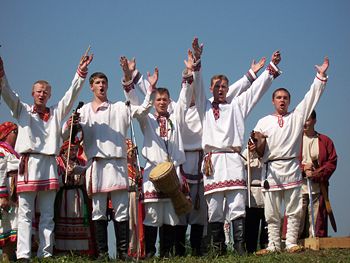
Toorama
Encyclopedia

Saransk
Saransk is a city in central European Russia and the capital of the Republic of Mordovia, as well as its financial and economic center. It is located in the Volga basin at the confluence of the Saranka and Insar Rivers, about east of Moscow...
, Mordovia
Mordovia
The Republic of Mordovia , also known as Mordvinia, is a federal subject of Russia . Its capital is the city of Saransk. Population: -Geography:The republic is located in the eastern part of the East European Plain of Russia...
in Russia
Russia
Russia or , officially known as both Russia and the Russian Federation , is a country in northern Eurasia. It is a federal semi-presidential republic, comprising 83 federal subjects...
, performing traditional songs and music
Music of Mordovia
The music of the Republic of Mordovia has a long history. The Republic of Mordovia is a federal subject of Russia . Its national anthem is "Shumbrat, Mordovia!" by Sergey Kinyakin and Nina Kosheleva, adopted in 1995....
of Mordvin ethnic groups, namely Erzya
Erzya
Erzya could refer to:*Erzya language, a Uralic language spoken in Russia.*Erzya Oblasts, the areas of Russian in which Erzya is spoken.*Erzya literature, literature written in the Erzya language....
, Moksha
Moksha
Within Indian religions, moksha or mukti , literally "release" , is the liberation from samsara and the concomitant suffering involved in being subject to the cycle of repeated death and reincarnation or rebirth.-Origins:It is highly probable that the concept of moksha was first developed in...
, Shoksha, and Qaratay
Qaratay
Qaratays are an ethnic group within Mokshas in Kamsko-Ustyinsky District, Tatarstan around the village of Mordovsky Karatay. They speak Tatar complemented by Moksha words, sometimes considered as a Qaratay Dialect of the Kazan Tatar language...
.
History
Created in 1990 by 4 researchers of Mordvin language and traditions across the USSR, Toorama was originally a choir of 9 men. Eventually, Vladimir Romashkin, a researcher and documentary film maker, emerged as the group's frontman. Eager to communicate in Russian and Erzya with audience, he made extensive introductions into every song and dance tune, traditions and rituals of Mordvin peoples, that became integral parts of each performance.The ensemble enjoyed popularity both locally (receiving the State Prize of the Republic) and on Moscow level (receiving in 1994 the Gold Medal and the Grand Prix of All-Russian Traditional Music Contest "Voices of Russia"), as well as in Finno-Ugric cultural events in Finland, Estonia etc. Its Finno-Ugric ties eventually brought forward the Latinized spelling of the group's name via "oo" for long "o" instead of single "o" used in its Russian name Torama.
The group appeared at traditional music and jazz+traditional music festivals in Estonia, Latvia, Poland, Sweden, and UK.
After several years, their repertoire evolved to include a richer instrumental part, made possible with reconstruction of extinct Mordvin instruments such as garzi violin. In 2002, the instrumental compositions became an important part of each performance and evolved into a separate direction of the group's activity.
In 2002, Vladimir Romashkin died. In his memory, a memorial museum was opened in his native village of Podlesnaya Tavla.
The group, while dropping its activity rate for several years, remained and continued its work, staying the standalone Mordvin traditional ensemble with the longest discography.
In 2007, a new animated movie Kuigorozh (upon a Mordvin tale) by Pilot Animation Studio in Moscow was released, making use of extensive consultations on Erzya and Moksha folklore with group's management and the group's music as a soundtrack.
Discography
- 1996 Toorama — Mordvin Songs — Songs from Erzya Mordvin. MIPUCD 502, 1996. Traditional Erzya songs (recorded and released in Finland)
- 2000 Toorama — Taga Eriaza Shkai! (in Erzyan language, recorded and issued in Estonia by Eesti erza-moksha söprade selts, Estonian Erzya-Moksha Friendship Association)
- 2001 MeNaiset & Toorama — Mastorava (an Erzya and Finnish language album in collaboration with Finnish female 8-piece choir MeNaiset (collaboration on compositions 8-12, recorded in Leonora Hall at the Kallio-Kuninkala Course Center of the Sibelius Academy in January 1997.); MMCD1; Label: Sterns.
- 2002 Toorama — Godspeed (recording: Kallio_Kuninkala, Javenpaa, Finland, IV/1996; recording & mixing: Jouko Kyhala; mastering: Finnvox/Pauli Saastamoinen; produced by Toorama in Moscow and Saransk, in Russia)

